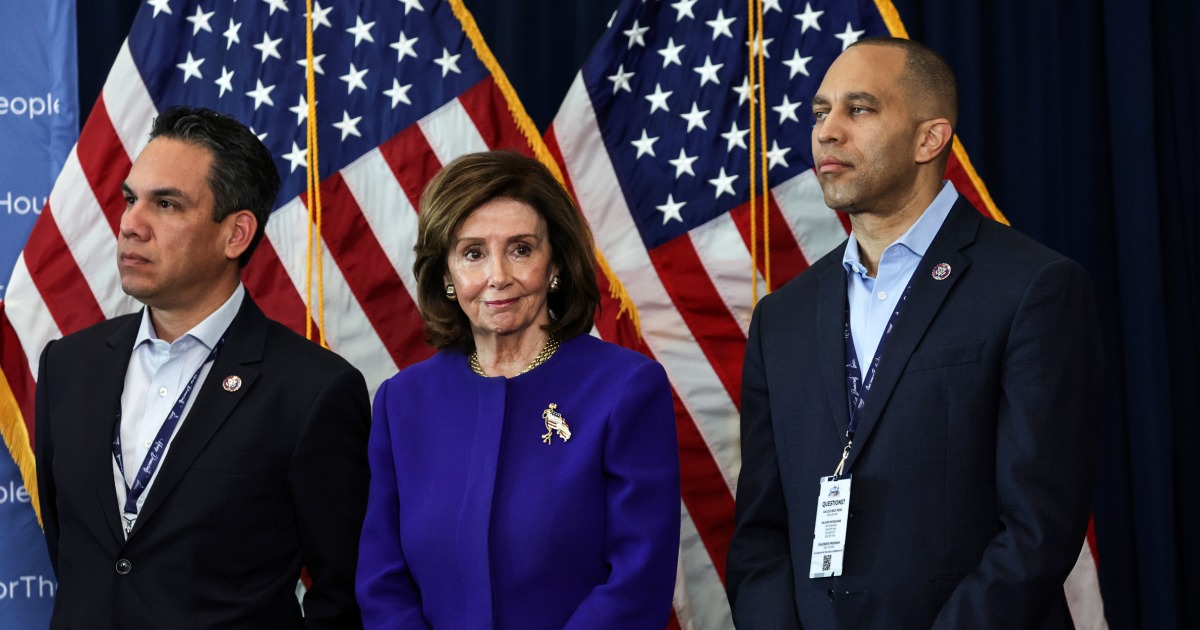The departure of House Speaker Nancy Pelosi could easily have led to a power vacuum in which a host of ambitious lawmakers, old and young, publicly fought for the chance to lead House Democrats. .
Instead, a new generation: Reps. Hakeem Jeffries, 52, of New York; Katherine Clark, 59, of Massachusetts; and Pete Aguilar, 43, of California, will almost certainly be elected to the top three leadership positions this week without a challenge or much fanfare.
There were a couple of bumps in the road. Some younger members are bitter that Majority Leader Jim Clyburn of South Carolina, 82, chose to remain in leadership rather than follow Pelosi, also 82, and Majority Leader Steny. Hoyer, 83, until sunset.
But overall, Pelosi and her almost certain successor, Jeffries, have been able to orchestrate a smooth passing of the torch from one generation to the next.
Shortly before Pelosi’s announcement Thursday that she would resign, Intelligence Committee Chairman Adam Schiff signaled that he would not be running for House leadership and would focus his efforts on a future Senate run. That prevented a protracted landslide between Schiff, a close Pelosi ally, fellow Californian and prolific fundraiser, and Jeffries, who is about to become the first black leader of a congressional caucus.
Hoyer of Maryland, who has served in the leadership since George HW Bush was president, also said he would not seek the top job and instead plans to return to the powerful Appropriations Committee.
And instead of taking over Clark for the No. 2 leadership position, Congressional Progressive Caucus Chair Pramila Jayapal of Washington decided to run for another term leading his group of about 100 House liberals.
However, Clyburn’s decision to remain in the leadership represented a setback for those who called for «new blood» and hoped for a complete break with the triumvirate of Pelosi, Hoyer and Clyburn that had ruled the Democrats for the past two decades.
Clyburn announced that he would be running for his old minority position, known as “assistant leader,” depriving younger members of that position. It had been considered work number 3.
Aguilar originally had his eyes on the assistant leader position, but Clyburn’s move forced him to run for caucus chair. Under a new arrangement, the assistant leader will move to No. 4 and the Democratic Caucus chair will move to No. 3.
That left Rep. Joe Neguse, 38, who had been campaigning behind the scenes for months for caucus chair, as the outsider.
Some Neguse allies urged him to stay in the race and take on Aguilar, frustrated by the ripple effect created by Clyburn’s decision. But Pelosi quickly endorsed the list of young leaders (Jeffries, Clark and Aguilar) and others followed his example, avoiding any possibility of a grassroots rebellion and a messy leadership fight between Aguilar and Neguse.
“There are a lot of annoying people. The feeling is that Speaker Pelosi and Leader Hoyer had the grace to step aside, and people can’t believe that Clyburn isn’t willing to do it. There’s really resentment there about the impact of the negative vote,» a younger House Democrat told NBC News.
“There is disbelief at the idea that it is simply a matter of clinging to power, not that there is any particular goal in sight. It’s hard to feel like we’re turning the page.»
A Clyburn spokesman did not respond to a request for comment. Clyburn has called Jeffries, Clark and Aguilar «our new generation of Democratic leaders,» but he has not weighed in on the Neguse situation.
Last week, a potential escape route emerged. Neguse informed colleagues on November 21 that he would officially drop his bid to chair the caucus and would run to chair the Democratic Politics and Communications Committee (DPCC), the messaging arm of House Democrats, if it could be restructured. the operation of the CCPD.
Shortly thereafter, Jeffries, Clark and Aguilar informed their members in a joint letter that a rule change would be offered this week to do just that: reform the DPCC to have an elected chair, likely Neguse, and three elected co-chairs below.
Some members have referred to that position as the «chairman of chairmen» and it is a structure that has been around before.
Neguse would almost certainly be the favorite to win that race. The son of Eritrean immigrants and Colorado’s first black congressman elected, Neguse saw his national profile rise after serving as a Democratic prosecutor during the second impeachment trial of former President Donald Trump.
For the past two years, he has served as one of DPCC’s four co-chairs, along with Reps. Matt Cartwright of Pennsylvania, Debbie Dingell of Michigan, and Ted Lieu of California; Dingell and Lieu are now among at least four candidates running for vice president of the Democratic Caucus.
“Over the past two years, I have worked alongside my fellow DPCC co-chairs to engage every member of our diverse caucus to develop our messaging framework,” Neguse said in a letter to colleagues Monday.
“That message of putting people over politics became an essential tool for our members as we defended our democracy and challenged historic norms by capping Republican gains in this year’s election.”
In addition to Dingell and Lieu, Reps. Madeleine Dean of Pennsylvania and Congressional Black Caucus Chair Joyce Beatty of Ohio are running for caucus vice chair. It is the number 5 position, seen as a stepping stone to other senior leadership roles.
The race to lead the Democratic Congressional Campaign Committee, the campaign arm of the House Democrats, for the 2024 cycle will feature a confrontation between two Californians, representatives Tony Cardenas and Ami Bera.

